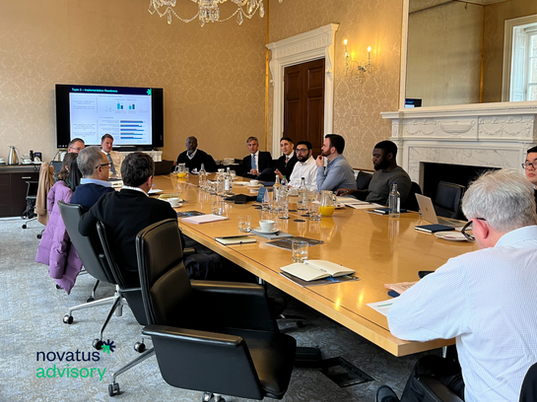
EMIR REFIT Readiness Report Roundtable: views from market leaders
On 21 February 2023, we held our third EMIR REFIT Roundtable, exploring EMIR challenges and REFIT implementation readiness, using the Novatus EMIR REFIT Implementation Readiness Report as a backdrop.
Experts from across the industry joined the Roundtable, with representatives from the sell side, buy side, market infrastructure and market associations and featured Alex Chow from Investment Association, which represents about 250 UK asset managers.
Here are some of the key takeaways discussed:
Ongoing remediation whilst implementing new rules
All participants feared remediation.
Our research revealed that 76% of firms are still undergoing remediation for EMIR, and many of the attendees at the Roundtable confirmed being in the same boat. The main sentiment was that regulators are increasingly focused on data quality and will perform thorough checks on reporting. However, divergences exist across regulators, with some EU NCAs being more stringent than others. Ultimately, it was agreed that remediation is inevitable if implementation of EMIR REFIT is not appropriately conducted.
EMIR REFIT Implementation challenges
The discussion flowed into the numerous challenges in implementing EMIR REFIT.
1. Data Mapping and Sourcing
Firms discussed the challenges with interpreting the wide variety of new and changing reporting fields as well as the determination of the appropriate OMS data points which would need to be mapped to the XML schema. Data availability was also raised as a particular concern, especially where new feeds from upstream/external systems would be required.
It was highlighted that certain data fields are unnecessary, in particular where the information is covered by more granular fields (UPI vs CFI codes). Industry insight suggested that ESMA might look to retire redundant fields in the future, but the FCA might be more reluctant to do so due to the fear of causing market disruption. Regulatory divergences are expected to occur in such cases.
2. Fields of most concern
Participants were not particularly concerned about new transaction identifiers, for example UPIs, due to the perceived reliance on external sourcing, for example through ANNA DSB, the product identifier (e.g. ISINs/ UPIs) generator.
However, Action/Event Type fields were mooted to be a challenge as OMS systems may not hold the data to map all of the Action/Event type combinations. This sentiment was echoed by the guest speaker, Alex Chow, who noted that firms must be able to account for 50+ different combinations of Actions and Event types through their reporting systems
3. Back reporting
Back reporting of outstanding derivatives was discussed as a significant challenge. While in theory, firms are permitted a 6-month period before back reporting, the reality is that derivative updates will force a T+1 reporting deadline in many cases. Therefore, most firms will back report the entire population on Day 1 and must have the capability, and data, of doing so upon go-live.
It was also raised that pairing and matching challenges are likely to arise as some firms will have back reported in T+1 while others may take longer. However, a degree of tolerance will likely be applied by regulators in the near term.
4. ESMA/FCA divergence and dual reporting
Due to the divergence in implementation dates, all participants agreed EMIR REFIT was akin to two separate projects and would require separate reporting streams. This was compared to the circumstances of EU and UK SFTR, albeit there was the mutual sentiment that EMIR is generally far more complex than SFTR.
EMIR REFIT Implementation Readiness
Our research found that 60% of self-reporting firms have started taking some action on implementing EMIR REFIT. However, it was clear that what this action is varied widely amongst our attendees. Some firms had already done some or all the required gap analysis, while others had not started.
Alex Chow, speaking on behalf of the Investment Association and its 250 members, noted that most would have started gap analysis around December 2022 and January 2023, following the publication of the technical documentation.
It was agreed that stakeholders are looking at ways to ensure that the right budget and resource is acquired within their teams to ensure appropriate implementation of EMIR REFIT. The collective sentiment was that, often, Senior Management are not aware and have little or no concern until issues arise.
Control Frameworks, Especially for Those Delegating Reporting
The importance of a robust control framework to detect and resolve errors and communicate reporting performance to senior stakeholders was discussed.
Firms must have arrangements in place to investigate and resolve reconciliation breaks and rejections notified by the Trade Repository. Controls must be in place to identify, on a timely basis, any misreporting caused by flaws in reporting systems which affect a significant number of reports, any reporting obstacle preventing the report submitting entity from sending reports, and any significant issue resulting in reporting errors that would not be captured by the trade repository’s reconciliation.
Firms must then send E&O forms to the regulator, which provide a more granular view of the firm’s reporting. This requires knowing the scope of the issue, the root cause, the expected fix and timeline. All require appropriate management information.
It is apparent that firms do not have appropriate oversight of their EMIR transaction reporting, in particular firms that delegate reporting. It was discussed that regulators increasingly focused on firms which delegate reporting to ensure that they have a strong understanding of submissions made on their behalf. The misunderstanding of senior management that you can delegate everything bar responsibility exacerbated these risks.
Our research showed a contradiction between the level of confidence that delegating firms have on their brokers’ reporting versus the confidence of firms who report themselves have over their own ability to detect errors. This is compounded by the fact that delegating firms seem too confident in their understanding of their reconciliation requirements.
How Novatus Can Help with EMIR REFIT Implementation
The consensus from the Roundtable is that firms must start EMIR REFIT implementation immediately if they have not already begun. Novatus is already leading multiple REFIT programmes and are prepared to support you in preparing for EMIR REFIT.
To discuss more, please reach out to Matthew Ranson (mranson@novatusadvisory.com) and Francis Stroudley (fstroudley@novatusadvisory.com).











